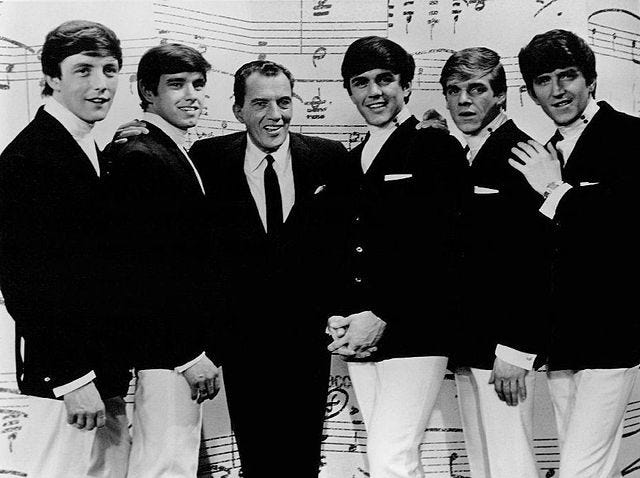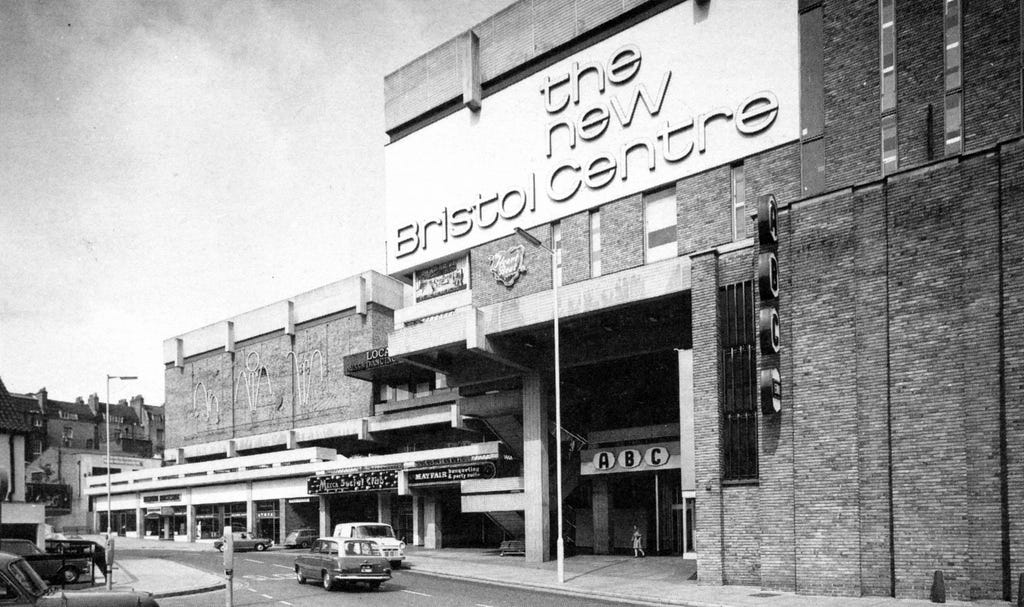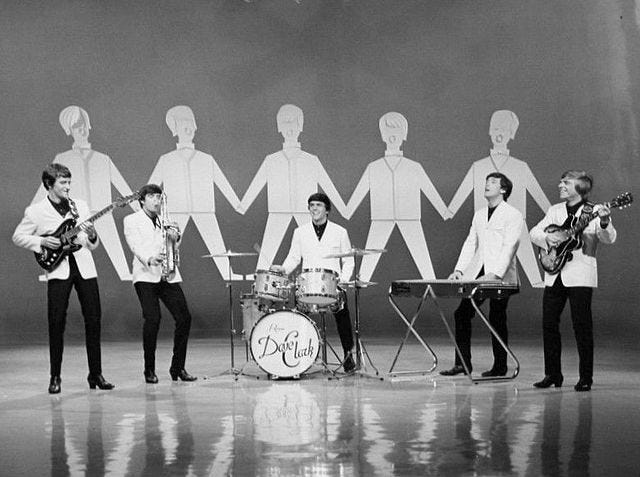The Mysteries of The Dave Clark 5
There are several riddles surrounding this enigmatic band who were, for a short time, almost as big as the Beatles

The Beatles had one main rival in 1963 and 1964: The Dave Clark 5.
They are largely a sixties and British Invasion pop music footnote these days but, for a short while the Dave Clark Five / DC5, were one of the most successful pop bands of the early sixties.
They were even more successful in the US than in their home country with seventeen top 40 US hits. They were the second British band to appear on the Ed Sullivan Show (after The Beatles) and appeared no less than 18 times, more than any other British band.
Like The Beatles, they served a long apprenticeship playing in clubs. In the DC5’s case, it was the gruelling UK-wide Mecca circuit of dancehalls rather than Liverpool’s Cavern Club and Hamburg.
Although the Mecca dance halls no longer exist, back in the sixties there was a Mecca in most major towns and cities in the UK. It was where youngsters would go to meet up and dance to the sounds of live bands and DJs.

Yet by 1965 and unlike the Beatles who had gone stratospheric, the DC5 were struggling to chart in the UK. And also unlike the Beatles, there are several mysteries surrounding this enigmatic band and their leader.
The Mystery of the Tottenham Sound
Before the British press invented the rivalry between The Beatles and The Rolling Stones, they fabricated a rivalry between The Beatles and The DC5. The DC5 were one of the few bands to challenge the success of the Beatles back in 1963/4. In reality, Dave Clark and John Lennon were friends and enjoyed their friendly competition.
Since the Beatles were the leaders of the ‘Merseybeat Sound’ — named after Liverpool’s River Mersey — the British press invented the ‘Tottenham Sound’ to describe the DC5’s own distinctive sound. The Dave Clark 5 came from Tottenham and the surrounding areas of North London.
The ‘Tottenham Sound’ was a drum-heavy stomping beat, a pumping sax riff and singer Mike Smith’s powerful vocals. This can be clearly heard in their first UK №1, Glad All Over in the video below and their stomping follow-ups, Bits And Pieces, Can’t You See That She’s Mine, Over and Over, Do You Love Me and Anyway You Want It.
There was no such thing as a ‘Tottenham Sound’. Unlike Merseybeat, which could be heard in any number of Liverpool bands of the day, the DC5 were the only ones with the so-called Tottenham Sound.
But the DC5's sound was certainly distinctive so where did it come from?
Before the band became famous, the DC5 went through a couple of line-up changes. One change was Mick Ryan, who was their former lead guitarist. Mick’s brother, Ron, was a singer and songwriter for his own band, The Walkers, and Ron was a close friend of Dave Clark.
Ron Ryan claims he realised the Dave Clark 5 needed a distinctive sound to stand out. He says he invented the Tottenham Sound for them based on a record called Your Ma Said You Cried In Your Sleep Last Night by Doug Sheldon, another London artist. It reached No.29 in the UK charts in 1962.
It certainly has that Dave Clark 5 sound.
Ryan claims to have written several of the DC5’s early hits based on this sound and that the hits were registered as written by Dave Clark under a handshake agreement with his former friend to promote the Dave Clark brand. He says the agreement was that he’d still get the royalties but this never happened.
Is this all sour grapes from Ron Ryan after his friend went on to global and commercial success or is there some truth to Ron Ryan’s claims? As became common with business dealings surrounding the Dave Clark 5, Dave Clark has never commented.
We’ll probably never know. The mystery of the Tottenham Sound remains.
The mystery of the band’s leader, Dave Clark
It’s unusual for a band to be led by their drummer. It’s highly unusual for a member of the band to also be their manager. And it’s extremely unusual that he was their producer too.
Dave Clark took control of all the group’s business interests from the beginning, including ensuring songwriting credits. He set up his own publishing company and owned the rights to their TV appearances. He even purchased the rights to the UK’s premier pop music show of the ’60s, Ready Steady Go.
He did all this from the age of around 23. There is also some mystery about his true age as it’s claimed the record company shaved three or four years off his true age..
When asked about the band’s mysterious financial and managerial arrangements many years later, former singer Mike Smith said, “No comment.”
The mystery of why the band’s music was not fully available until 2019
It was not possible to buy DC5 music in any format between 1978 and 1993 after Dave Clark withdrew global licensing rights.
In 1993, Dave Clark belatedly released a greatest hits compilation on CD but it wasn’t until 2008 that another hits album was released. This was followed by a limited selection of their songs on iTunes.
It was not until 2019 that the DC5’s entire back catalogue became available on all formats.
Why was the music of one of the early sixties most successful and popular bands made unavailable? No one knows and Dave Clark isn’t telling. The mystery remains.

The mystery of Dave Clark’s later work
After the demise of the DC5, Dave Clark began many new projects, some less well-known than others. He produced TV shows and documentaries and owns several companies.
He wrote and produced a successful stage musical, Time, in 1986 with many successful songs.
Clark asked Freddie Mercury to be part of the show but he declined. He did agree to record In My Defence for the soundtrack album. The song was written by Clark, David Soames and Jeff Daniels.
Dave Clark had become close friends with Freddie Mercury and was with him when he died. It was Clark who phoned Mercury’s parents to break the sad news of his passing.
They went back to the studio in 1986 to record another track, Time Waits For Nobody, another song written by Dave Clark along with Jeff Daniels.
It was a minor hit but an incredible piano version was released more recently by Dave Clark.
It appears that the DC5 were just Dave Clark’s first business venture of many.
The mystery of why the band failed to keep up with The Beatles
By 1965, The DC5’s time as The Beatles' rivals was gone. They were unable to keep up with the rapidly shifting pop music scene or the emergence of other bands, such as the Kinks and Stones with their own new sounds. They were left trailing the pack with their dated ‘Tottenham Sound’ or releasing poor imitations of the latest Beatles sound.
They still registered the occasional hit, such as the ballad Everybody Knows from 1967, but they were no longer the force they’d been.
Their time was over and the mystery of their decline was solved; the DC5 had been unable to adapt to the new trends in popular music, particularly psychedelic pop. They finally disbanded in 1970 and Dave Clark merely moved on to his next set of business ventures.
SOURCES:
Daily Express Online; The Beatles Forum: Ron Ryan; Business lessons from rock — Ron Ryan interview part one, & part two; daveclark5.com; Rock and Roll Hall of Fame — DC5; Psychedelic Scene Magazine; Liveabout.com; shsu.edu; Lost Bands of Yesteryear #2 — The Dave Clark Five; dailymailonline; Rolling Stone Magazine




I don't rely on sites nor anything Clark says as he doesn't tell the truth. As for the vast majority of info on the internet it has come from once source Clark himself, I rely on face to face interviews then checking with correct sources such as newspapers from the time. A simple search on Ancestry will give you the answer to his birth though - 1939 - mother's maiden name Bartlett. When the DC5 became famous they were already too old, the record company made them knock a few years off their ages, as Len was the smallest he became the youngest even though Mike Smith was actually the youngest. The Tottenham sound is quite funny too as when GAO became a hit they were resident at Basildon and hadn't played at Tottenham for some years. The Basildon sound anyone?
Glad they weren't abused by record companies